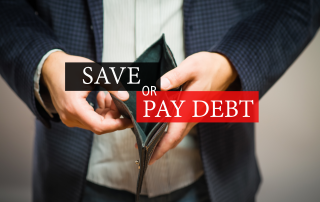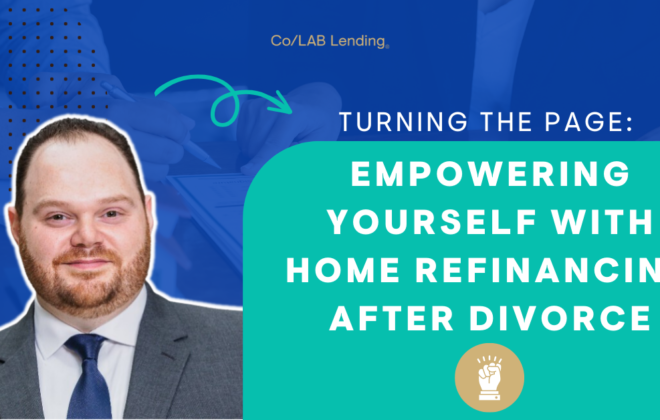Should I Pay Back Debt or Start Saving?
To pay back debt, or start saving: that is the question. Common advice and some simple math will probably lead you to believe that paying off debt is always the best option; however, this might not always be the case.
Generally, there are two common positions in which borrowers find themselves. In order to understand which financial move is right for you, it’s important to understand into which category you fall:
- Those with high-interest debt
- Those with low-interest debt
Once you understand your dilemma, you can decide with more confidence whether or not to start paying back creditors or save your funds for a rainy day.
Situation #1: High-Interest Issues
Undoubtedly, if your interest is higher than the dividends you’re receiving from your savings, stocks, investments, etc., then yes, you’re losing money. By paying off high-interest credit card debt or loans, you can pretty much guarantee yourself greater savings than any possible returns.
Paying down high-interest debt can also help you avoid falling into recurring debt. To ensure you don’t accrue late fees in conjunction with interest, set up automatic payments that withdraw from your account on the same day every month. Just be sure to budget for this debited amount to avoid overdraft costs.
Another solution is to open a low-interest credit card that allows a low-cost balance transfer. This allows borrowers to consolidate their debt. Additionally, cards of this type often offer new cardmembers an introductory 0% APR period. This grace period can help you get ahead of your debt.
That being said, credit transfers can also hurt your credit. If you close your old credit account, this can appear on your credit report as a red flag to lenders that you’re a higher risk borrower. Essentially, multiple responsibly-used credit cards prove to lenders that you’re a safer customer than those who have one maxed-out line of credit.
However, when it comes to making additional payments on a mortgage or your student loans, it’s important to reevaluate. While it can be helpful to take this financial initiative, lenders do not lower interest rates or monthly payments just because a borrower is paying the loan off faster.
For that reason, it can be more beneficial to start saving rather than paying off debt. After all, it’s always helpful to have a little nest egg.
Situation #2: Low-Interest Debt
When an unexpected expense comes up, you want to be prepared so as not to have to borrow again from an even higher interest lender. As previously stated, it’s critical to consider your current interest rate(s). Moreover, if paying off debt means ditching your emergency savings or skimping on a valuable retirement plan through your job, it may be high time to reevaluate your financial strategy.
Common emergency expenses like home repairs, car repairs, and emergency room visits can be extremely expensive and force people to borrow beyond their means at a higher interest rate. Unfortunately, these types of extenuating circumstances often lead to cyclical patterns of debt. This is why most experts agree that your emergency fund should be at least three to six months’ worth of expenses.
Another situation in which it may be best to save before you pay is if your job is offering you a retirement package with compounding interest and/or an employer match. When this is the case, it’s important to take full advantage of this time and invest as much as you can.
Yes, you still have to make your monthly mortgage payment, but it may not behoove you to make additional payments. This same principle stands for student loans. In fact, if student loans are getting in the way of fully utilizing your retirement plan, look into deferring them to temporarily stop or reduce your monthly payments.
Our advice here at Co/LAB Lending
Because when it comes to paying back debt or start saving everyone’s situation is different, it’s important to crunch some basic numbers. First, take a look at your credit card debt as it tends to carry a higher interest rate (somewhere between 12-23%). When you’re only making minimum payments with a high balance, it’s going to take years and a whole lot of money to see a zero balance.
For instance, if you have a $3,000 credit card balance with 19% interest and you’re only making minimum payments of say, $110 dollars, you’re most likely going to spend upwards of $1,000 in interest. For these reasons, it can be advantageous to take care of this debt before attempting to save.
On the other hand, if you’re tempted to pay more than your monthly mortgage or student loan bill every month, be sure to investigate the benefits of boosting your retirement plan and/or building up your emergency fund first.
If you’re interested in refinancing options and our interest rates, click here to contact Co/LAB Lending to learn more about our products.
Mortgage Consultation Today!
Categories
- Credit (4)
- FHA Loans (3)
- Finances (3)
- First Time Home Buyers (6)
- Grab Bag (7)
- Home Technology (1)
- Homebuying Tips (17)
- Inspiration (1)
- Insurance (3)
- Interest Rates (3)
- Loan Process (1)
- Mortgage Financing (14)
- Motivation (1)
- News (1)
- Press Release (8)
- Renovation (2)
- Self Employed (1)
- Tips & tricks (1)
- Uncategorized (134)
- USDA Loans (1)
- VA Loans (2)




